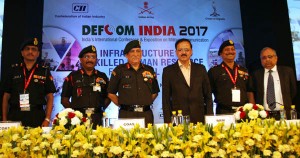Sanjeev Pargal

JAMMU, Mar 23: Army chief Gen Bipin Rawat said today that Army has to be prepared to meet any kind of situation along the border and called upon the troops to be ready for technological warfare in future, which has to be inducted into the Army’s communication system.
At the same time, Minister of State for Defence Dr Subhash Bhamre said that increasing infrastructure for the `Digital Army’ based on state-of-the art technologies is top priority of Narendra Modi Government and no efforts would be spared to meet requirements of the troops.
The MoS Defence and the Army chief were addressing ” DEFCOM INDIA 2017″ with the theme `Infrastructure and Skilled Human Resource for Digital Army’ in the Union capital, an official handout released to the Excelsior by the Press Information Bureau (Defence wing) said.
Calling upon the troops to keep pace with the changing technologies before the existing technology becomes obsolete, Gen Rawat said the armed forces should be prepared for conventional warfare along the country’s borders and advanced technology for military must be made available on a fast track mode.
Without naming China and Pakistan, the two hostile neighbours of the country, the Army chief said India will continue to face conventional or non-traditional forms of warfare and the Army has to be prepared for any kind of situation to deal with such challenges.
He said that adequate focus must be given to ensure that “trial procedure” for procurement of military systems didn’t linger on for too long.
“The armed forces have to be ready for non-conventional war,” the Army chief said in his strong remarks at the `DEFCOM INDIA’, which assumed significance in view of growing strength of People’s Liberation Army (PLA) of China amidst reports that China has been strengthening the PLA in technological warfare. However, Pakistan army was far behind the technology as compared to the Indian Army.
Stressing the need to adopt the latest technologies for the armed forces without any delay so that it does not become obsolete after induction, Gen Rawat said: “we will have to identify the correct type of technology for the armed forces and ensure that our trial procedure do not linger on for long”.
“Communication technology for the armed forces must be simple, light-weight and easy to maintain as they will be required for wars on the borders, he said adding the technology must work in extreme weather conditions,” he said and sought help of the Government especially the Defence Ministry in equipping the Army with latest technology.
The Army chief also referred to the social media saying the “adversaries” appeared to be taking advantage of it.
He also talked about the need for having proper encryption mechanism, both for voice and data, for communication network for the armed forces.
“Army has to keep pace with the digitized world and ensure that most of its systems are digitized as early as possible. At the same time, it has to be remembered that war will be fought on the borders and our preparations has to be made in that direction,” Gen Rawat said.
Gen Rawat strongly pitched for fast-tracking procurement of defence systems to enhance India’s military capability and said armed forces must remain ready for warfare along the borders.
He also said adequate focus must be on ensuring that “trial procedure” for procurement of military equipment does not linger on for too long.
The Army chief said high-tech products must be acquired for the armed forces on a “fast-track” mode so they do not become obsolete on procurement.
“Whatever we have to induct must be done through fast-track procedures as technology becomes obsolete very soon. It is important that we are able to identify the correct type of technology and equipment that is to be inducted into the armed forces. We have to ensure that the trial procedures do not linger for long,” he said.
Allegations of graft in a number of procurement deals and red tape are cited as reasons for delays in acquisition of weapon systems and military hardware, affecting modernization of the armed forces.
The Army chief said there is a need to modernize communication systems used by the armed forces as future wars are going to be complex and the nature of warfare is rapidly changing.
Gen Rawat said the Army has to keep pace with the “digitized world” and ensure that most of its systems are digitized as early as possible.
Addressing the function, Minister of State for Defence Subhash Bhamre said the Central Government was committed to fulfill requirements of the armed forces and that information technology can act as a force multiplier.
He said enhancing digital infrastructure for the army is a top priority for the Government.
The initiative for creation of operational information networks and systems should be expedited at all levels, he said, adding a robust, secure, high capacity data network system is an urgent necessity for Operational Commanders.
The Minister, however, said that the creation of digital infrastructure for the Army will need indigenous solutions and systems from security point of view.
Dr Bhamre emphasized that creation of indigenous capabilities in Information and Communication Technologies (ICT) for Defence sector will give a major fillip to the `Make in India’ programme.
Speaking on the occasion, CII’s Chandrajit Banerjee pitched for early notification of the strategic partnership for defence production between the government and the defence industry.
The two-day event was organized jointly by the Corps of Signals of the Indian Army and the Confederation of Indian Industry. It was also addressed by Signal Officer-in-Chief and Senior Colonel Commandant, Corps of Signals Lt Gen Ashish Ranjan Prasad. It was attended by senior officers from the Armed forces, Indian industry, academia and Research and Development organizations.

